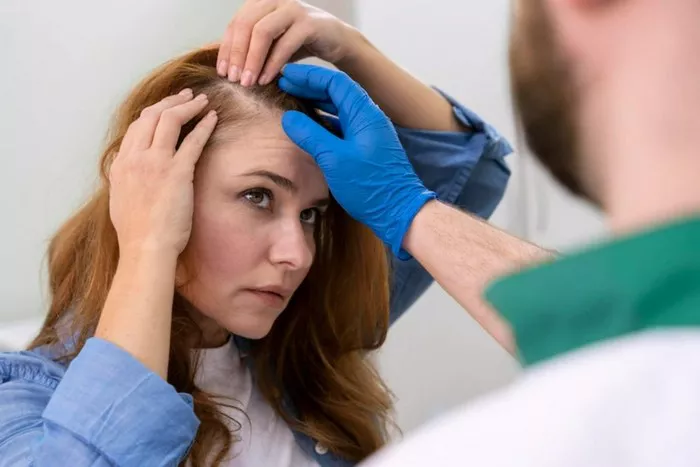Hair loss is a common concern for many women, and finding effective treatments is a priority. Medications and supplements have become popular options for addressing female hair loss. In this article, we’ll explore some of the medications and supplements commonly used for treating hair loss in women. Additionally, we’ll answer frequently asked questions to provide a comprehensive overview of this topic.
I. Medications for Female Hair Loss
1. Minoxidil
Minoxidil is an FDA-approved topical medication widely used to treat hair loss in both men and women. It works by increasing blood flow to the scalp and stimulating hair follicles. Minoxidil is available over the counter in various forms, including liquid, foam, and shampoos.
To use minoxidil, apply it directly to the scalp once or twice a day, depending on the product’s instructions. It may take several months of consistent use to see noticeable results. Minoxidil is generally well-tolerated, but some individuals may experience scalp irritation or dryness.
2. Finasteride
Finasteride is an oral medication primarily approved for treating male pattern baldness. While it is not FDA-approved for use in women, some healthcare providers may prescribe it off-label to women with hair loss caused by hormonal imbalances, such as polycystic ovary syndrome (PCOS).
Finasteride works by inhibiting the hormone dihydrotestosterone (DHT), which is associated with hair loss. It may take several months to see results, and potential side effects include changes in menstrual cycles and mood swings.
II. Supplements for Hair Loss
1. Biotin
Biotin is a B vitamin that plays a crucial role in maintaining healthy hair, skin, and nails. It is commonly found in many hair growth supplements and is believed to promote hair growth and strengthen hair.
While biotin supplements are generally safe, it’s essential to consult with a healthcare professional before starting them, as excessive biotin intake can lead to potential side effects.
2. Iron
Iron deficiency is a known cause of hair loss in women, particularly those with anemia. Iron supplements can help address this deficiency and improve hair health.
If you suspect iron deficiency as the cause of your hair loss, consult with a healthcare provider for proper diagnosis and guidance on iron supplementation.
3. Vitamin D
Vitamin D is essential for hair follicle health and may play a role in preventing hair loss. Some studies suggest a correlation between vitamin D deficiency and hair loss.
Supplements may be recommended if you have a vitamin D deficiency, but it’s crucial to have your vitamin D levels checked by a healthcare provider before starting supplementation.
4. Saw Palmetto
Saw palmetto is a natural supplement derived from the berries of the saw palmetto plant. It is believed to help reduce levels of DHT, a hormone associated with hair loss.
While saw palmetto is considered safe for most people, it’s advisable to consult with a healthcare provider before using it, especially if you have any underlying medical conditions or are taking other medications.
III. FAQs on Medications and Supplements for Female Hair Loss
Q1: Are medications and supplements effective for all types of female hair loss?
Medications and supplements may be effective for some types of female hair loss, such as androgenetic alopecia (female pattern baldness) or hair loss related to hormonal imbalances. However, they may not be effective for hair loss caused by other factors like illness, medication side effects, or stress.
Q2: How long does it take to see results with hair loss medications and supplements?
The timeline for seeing results can vary depending on the individual and the specific medication or supplement. It may take several months of consistent use to notice improvements in hair growth and health. Patience and adherence to the recommended regimen are essential.
Q3: What are the potential side effects of hair loss medications and supplements?
Potential side effects vary depending on the specific medication or supplement. For example, minoxidil may cause scalp irritation, while finasteride may have hormonal side effects. Supplements like biotin, iron, and vitamin D are generally safe but can lead to adverse effects if taken excessively.
Q4: Can I use both medications and supplements for hair loss simultaneously?
Combining medications and supplements for hair loss is possible but should be done under the guidance of a healthcare provider. It’s essential to avoid excessive intake of specific nutrients and to monitor for any potential interactions or side effects.
Q5: When should I consult a healthcare provider about my hair loss concerns?
If you are experiencing significant hair loss or are unsure of the underlying cause, it’s advisable to consult with a dermatologist or healthcare provider. They can help diagnose the cause of your hair loss and recommend appropriate treatment options, which may include medications or supplements.
In conclusion, medications and supplements offer various options for women seeking to address hair loss. While these treatments can be effective, it’s crucial to consult with a healthcare provider before starting any new regimen to ensure safety and efficacy. Additionally, maintaining overall health through a balanced diet and lifestyle practices can support the effectiveness of these treatments in promoting healthier, fuller hair. If you have concerns about hair loss, seeking professional guidance is a crucial step towards finding the most suitable solution for your specific needs.

